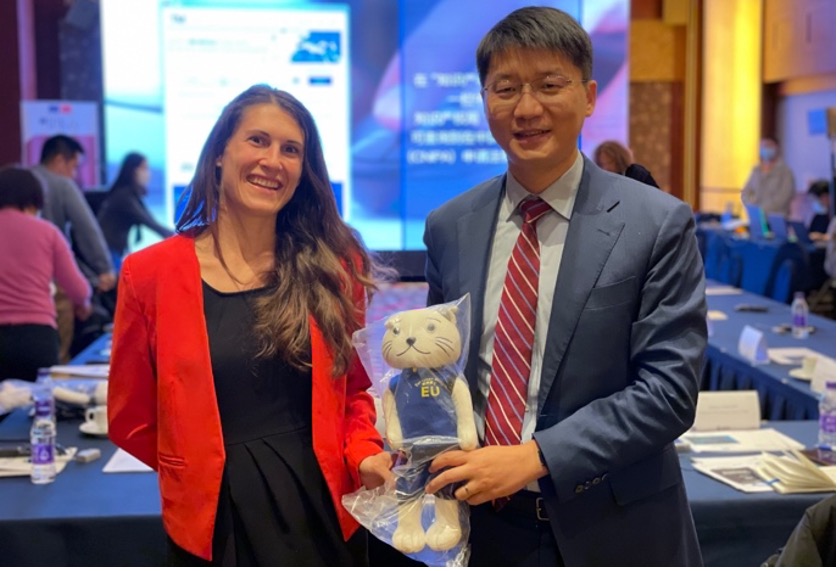The 2021 EU-China Forum on Criminal IP Enforcement, co-organized by Quality Brands Protection Committee of China Association of Enterprises with Foreign Investment (QBPC) and IP Key China, concluded successfully on December 2.
The two-day event was held at the Kempinski Hotel in Beijing with most participants joining online. Nearly 200 representatives from the EU Delegation to China, EU Intellectual Property Office (EUIPO), European Anti-fraud Office (OLAF), EU Chamber of Commerce in China (EUCCC), relevant embassies of foreign countries, Shanghai Food, Drug and Environment Crime Investigation Department of Public Security Bureau, Shandong Food, Drug and Environment Crime Investigation Department of Public Security Bureau and local detachments, Heilongjiang Food, Drug and Environment Crime Investigation Department of Public Security Bureau and local detachments, Liaoning Food and Drug Crime Investigation Department of Public Security Bureau, Guangzhou Food, Drug and Environment Crime Investigation Department of Public Security Bureau, Ningbo People's Procuratorate, QBPC member companies and relevant industry associations from home and abroad attended the forum. The EU Delegation to China, EUIPO and OLAF all gave their generous support to the forum.
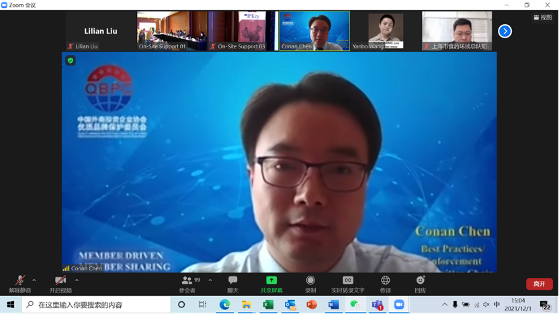
Conan Chen
Conan Chen, QBPC Best Practices/Enforcement Committee (BPEC) Chair, presided over a brief opening ceremony. Helene Juramy, Trade / Intellectual Property Officer of the EU Delegation to China, first delivered a speech on behalf of the EU side. She stated that China-EU intellectual property cooperation had a long history, and the forum was another important opportunity for multiple parties to strengthen cooperation in IP protection. As she said, Intellectual Property Rights (IPR) protection was a topic not only for the economy, but also for the security of consumers. IP Key China attached importance to IPR protection and the implementation of related mechanisms and looked forward to working with all parties on key issues such as IPR protection for cross-border e-commerce, going to the source of counterfeiting, and trade secret protection. The aims were to jointly address new challenges in IPR protection, protect the IPRs of European companies in China and improve the IPR environment.

Helene Juramy
Subsequently, QBPC Chair Michael Ding mentioned in his speech that since 2001, QBPC and IP Key China had been working closely and jointly committed to promoting the continuous improvement of China's IP business environment. He briefly introduced the work done by QBPC in advancing the criminal IP protection, including maintaining close communication with relevant central and local law-enforcement and judicial authorities, promoting best practices through activities such as the selection of the top ten cases and enhancing local empowerment. In Michael's opinion, China's IP protection had made remarkable strides in relevant law and regulation revision, administrative law enforcement as well as criminal and civil judicial practices. Meanwhile there was still room for further improvement. Various IP cases of different industries in different regions could be better managed in a more efficient, more predictable and more sustainable manner. It was expected that through the forum, law enforcement officials, experts and IP right holders could exchange ideas and discuss best practices and newly emerging criminal protection issues for follow-up and implementation.

Michael Ding
Recollection of the Panel Discussions at 2021 EU-China Forum on Criminal IP Enforcement
The 2021 EU-China Forum on Criminal IP Enforcement featured four panels, namely, international collaboration and exchange on the Criminal Enforcement of IP, new trends and challenges on the Criminal Enforcement of IP, joint governance and collaboration among stakeholders on Criminal IP Enforcement, and economic elements on the criminal enforcement of IP. The twenty speakers ranged from officials from EU national law enforcement agencies to law enforcement officers from relevant Chinese provinces and cities with extensive frontline experience as well as representatives from right holders, associations and law firms. The participants benefited from their enlightening presentations and discussions, which were rich in details and combined with numerous case studies and practical experience. Let us recollect the key points of the panel discussions.
Panel 1: New Trends and Challenges on the Criminal Enforcement of IP
Due to the booming e-commerce and the impact of COVID-19, the cross-border e-commerce counterfeiting showed trends and characteristics of organization, globalization, intelligence, concealment, and intricate value and supply chains. It became one of the major challenges in combating IPR infringement, which seriously damaged the rights and interests of right holders and even jeopardized public safety and health.
Activity Coordinator at IP Key China Andrea Caballe moderated this panel. QBPC Best Practices/Enforcement Committee (BPEC) Chair Conan Chen explained and analyzed the trends, characteristics, barriers and countermeasures of cross-border counterfeiting with relevant cases as examples. Yu Jiasheng of Intellectual Property Crime Investigation Detachment of Shanghai Food, Drug and Environment Crime Investigation Department of Public Security Bureauintroduced new trends in cross-border IP crimes and ground for criminal enforcement through case studies. Dominique Klein, Liaison Officer of Minister Counsellor at the European Anti-Fraud Office (OLAF), introduced the responsibilities of OLAF, joint operations with the Customs and relevant investigations. Lennart Nilsson, Counsellor of Economic and Trade Affairs, Team Leader of Transition, Growth and Trade in Embassy of Sweden in Beijing, introduced the IPR protection work of the Swedish Customs and the intervention measures and risk control methods against infringement.
Currently the issue of responsibilities and obligations of cross-border e-commerce platforms has attracted attention. The jurisdiction and entry point of criminal enforcement authorities could be clarified by analyzing the role of illegal cross-border e-commerce platforms in the cross-border sale of counterfeit and infringing products and their criminal acts. Under the current situation, it was important to study and formulate guidelines for the protection of intellectual property rights in cross-border e-commerce, so as to guide the platforms in preventing intellectual property risks. Cross-border e-commerce cooperation has been prioritized in the EU-China cooperation on Customs & IP. And the 2021-2024 Action Plan for Customs Enforcement of IPR would focus on statistics, case information, joint operations, policy and enforcement experience sharing, as well as facilitating exchanges between Customs and other enforcement authorities and business communities.
The speakers agreed that international law enforcement agencies should actively promote efficient international judicial collaboration to greatly enhance cross-border IPR protection enforcement, and combat counterfeit goods along the whole chain and protect public safety and innovation by promoting multi-party information and intelligence sharing and exploring multi-party cooperation mechanisms. In addition, based on the traditional political-policing cooperation model under the international law framework system, a cross platform IPR protection and management mechanism could be formed through the exchange of the intelligence and information between right holders or associations, e-commerce platforms and law enforcement agencies, which could simplify the cumbersome document flow process and improve the efficiency of investigative activities.
During the Q&A session, there were also lively discussions on criminal jurisdiction, the coordination between customs and public security authorities, international cooperation between customs authorities and other law enforcement authorities of various countries.
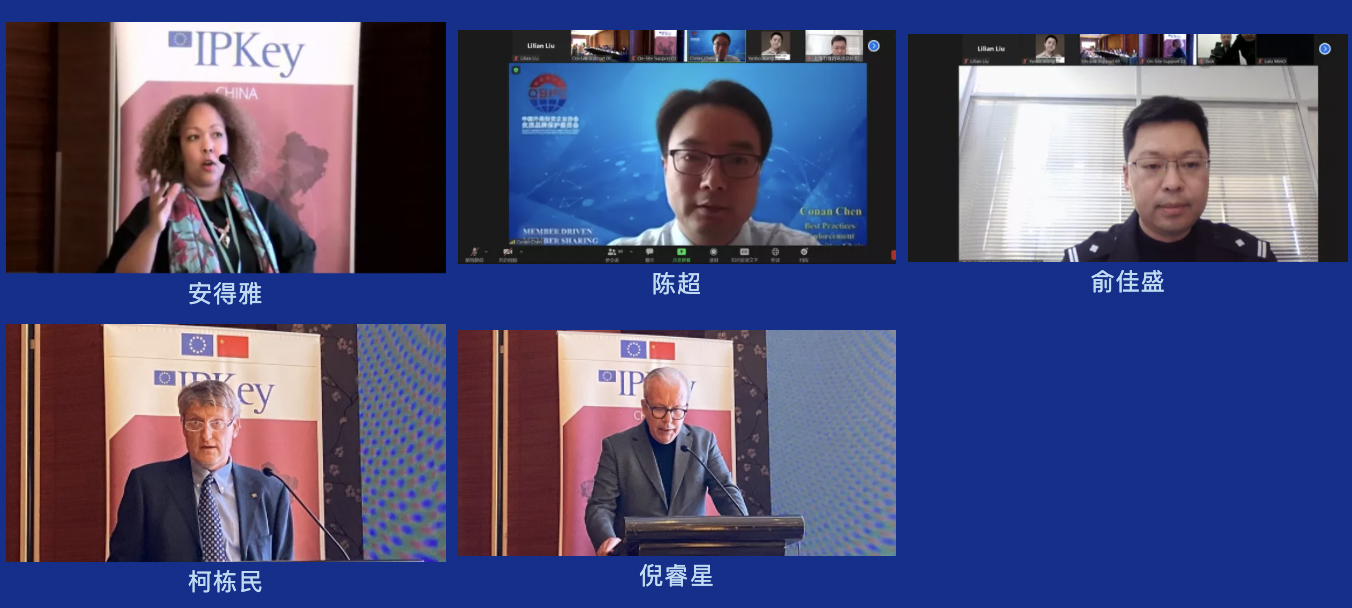
Panel 2: New Trends and Challenges on the Criminal Enforcement of IP
QBPC BPEC Vice Chair Nora Zhang presided over Panel 2. Huang Mingyu, deputy director of Intellectual Property Office of Ningbo People's Procuratorate, shared the new trend, new challenges and new exploration on Criminal Enforcement of IP in judicial practice of intellectual property criminal cases in Ningbo. Huang introduced the exploration carried out by Ningbo Procuratorates from four aspects under the new trend; Ji Ying, QBPC Vice Chair and Pharmaceutical & Medical Devices IWG Coordinator, introduced the impact and significance of the 11th Amendment of the Criminal Law on combating intellectual property crimes from the perspective of right holders, and put forward countermeasures and suggestions on relevant issues; Then, Felix Zhang, Regional Anti-Falsified Medicines Lead of North Asia and Oceania, Global Security of Novartis, introduced the legislative trend, controversial focuses and reviewed relevant cases with the subject of Challenges and Effort in Combating Falsified Medicines under New Laws; Elliot Papageorgiou, National Chair of European Union Chamber of Commerce in China IPR Working Group, briefly analysed criminal IP enforcement in China from the perspective of European IP owners in China, and make suggestions for improvement; Finally, Wu Qian, Senior Sergeant of the Fourth Rank in Shandong Food, Drug and Environment Crime Investigation Department of Public Security Bureau, explained the trend of criminal cases involving drugs, successful experience in handling cases and work plans in the future.
With the continuous improvement of China's intellectual property laws, regulations and protection system, the protection of intellectual property has been strengthened, the scope of criminal protection of intellectual property has been expanded, and the whole-chain intellectual property case handling mechanism has been more comprehensive, which can better protect the rights and interests of right holders in intellectual property criminal cases. Strengthening criminal IP protection requires increasing the cooperation and linkage between public security bureaus (PSBs), procuratorates and courts to promote all-round judicial protection, and emphasize the connection between administrative and criminal enforcement. In addition, we need to pay attention to the important role of right holders in the whole process of criminal enforcement and promote exchanges and communication with right holders.
The new laws, regulations and relevant policies will inevitably bring about changes and impact to the criminal IP enforcement of right holders and authorities. The 11th Amendment to the Criminal Law incorporate the counterfeiting of service trademarks into the management domain of the crime of trademark infringement in the criminal law, which has played a positive role in the development of service industry and the optimization of its industrial structure. However, after the implementation of the amendment, the application of "illegal gain", the amount threshold of conviction and the identification of serious circumstances and other related issues need to be further clarified. Intellectual property crimes in medicine and some other fields are directly related to public safety and people's life and health. After the revision of the drug administration law, the strategy and countermeasures have to be adjusted in PSB investigation and the right holder’s brand protection process. In addition, with the increasing punishment over crimes against trade secrets, the law enforcement agencies need to overcome the barriers in handling relevant cases including difficult technical identification, large disputes over the application of law, and multiple processes and long cycles.
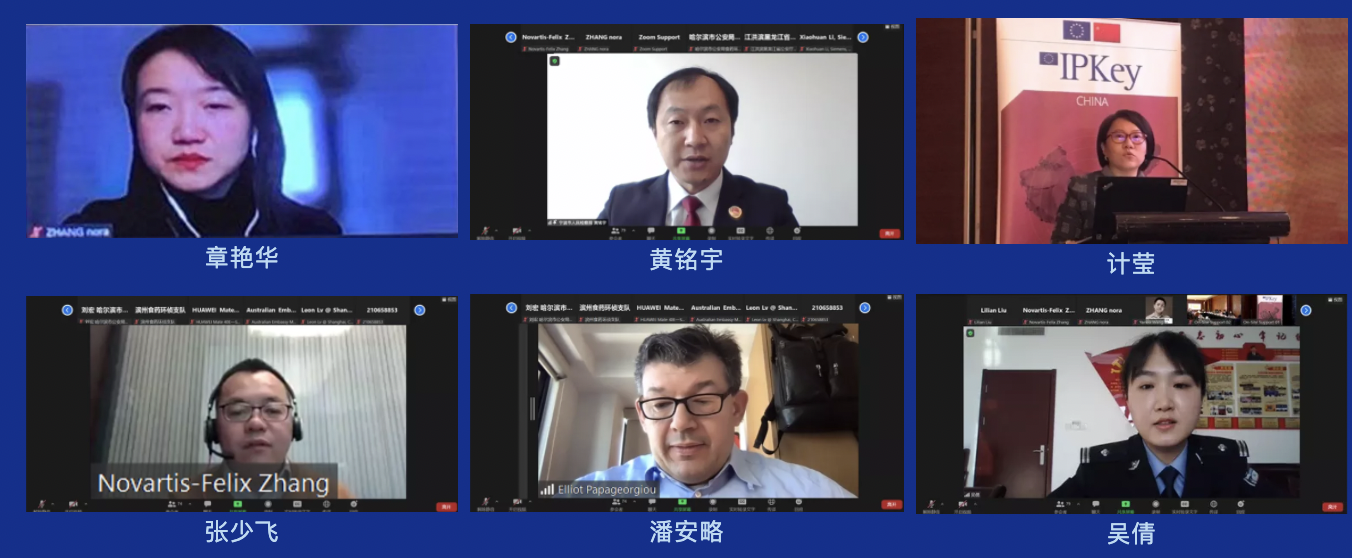
Panel 3: Joint Governance and Collaboration among Stakeholders on Criminal IP Enforcement
Andrea Caballe, Activity Coordinator at IP Key China hosted this topic. Wang Yifeng, Chief of the Fourth Detachment of Guangzhou Food, Drug and Environment Crime Investigation Department of Public Security Bureau, introduced the detachment work, case investigation data, information system, crackdown management, experience of investigation exploration and cooperation between police and enterprises over the years. Wang Xiaodong, Head of Intellectual Property Detachment of Liaoning Food and Drug Crime Investigation Department of Public Security Bureau, started from the status and characteristics of criminal IP protection in Liaoning Province to analyze the problems related to collaborative governance of criminal protection of intellectual property and the prospect of relevant work in the future; QBPC BPEC Vice Chair Peter Yang shared the social co-governance of criminal protection of intellectual property rights from the perspective of right holders, including the trend of IPR crimes, practical challenges of social co-governance of criminal protection, and suggestions on joint cooperation. Thomas Jullien of Bordeaux Wine Council and Zhu Zhigang, Partner/Senior Attorney-at-law from Wan Hui Da respectively shared introduction of the Council, protection of geographical indications, highlights of classic cases and achievements in intellectual property protection in China. Salvatore Paiano, Enforcement Officer at the Italian Embassy, shared his work from the perspective of the Italian financial police on the criminal protection of intellectual property, the way of countering counterfeiting, the mode of action and the method of operating inputs. Tangi Olier, Head of the Counterfeit Department, Service of Information, Intelligence and Strategic Analysis on Organized Crime, French National Counterfeit Office, also introduced the organizational structure of the office and its successful experience in combating counterfeit money and industrial counterfeiting.
One speaker pointed out that local PSBs, procuratorates and courts should have a unified standard of law application for cracking down on IPR cases involving trademarks, patents and trade secrets, so as to facilitate smooth and efficient cooperation.
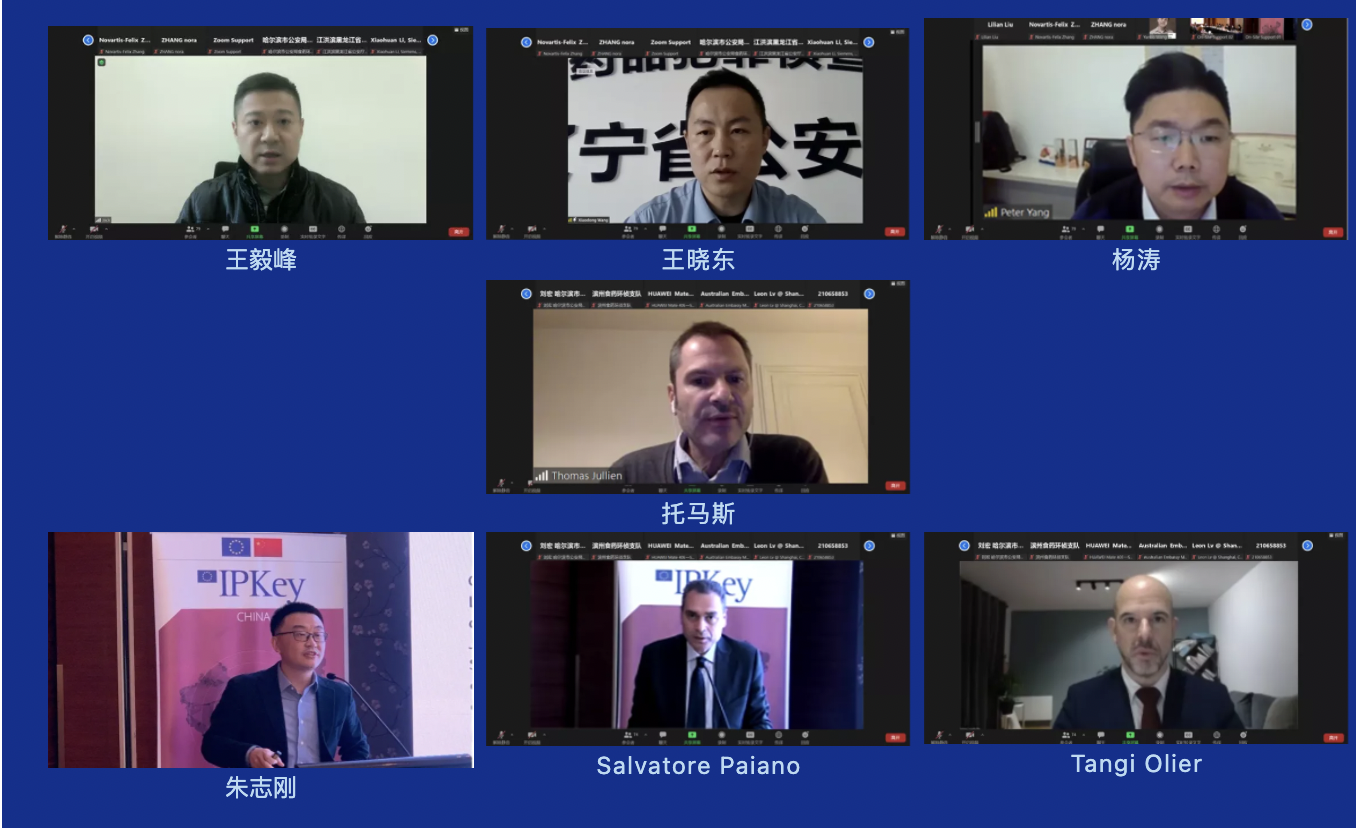
Panel 4: Economic Elements on the Criminal Enforcement of IP
Economic elements on the Criminal Enforcement of IP refer to economic basis in a broad sense, including new technological means and other factors. This topic was moderated by QBPC BPEC Vice Chair Zhang Hongkai. QBPC Government Affairs and Public Policy Committee Chair, Artificial Intelligence & Digital IWG Coordinator Tao Yang first introduced the characteristics and trends of digital crimes, and introduced the overall strategy and coordinated actions to combat digital crimes. International Federation of the Phonographic Industry (IFPI) Director of Insight and Analysis David Price and Acting Director of Global Content Protection & Enforcement Melissa Morgia jointly introduced the content protection of IFPI and related cases in China and the world. Mick Ryan, Alibaba Platform Governance Director, explained Alibaba's economic system, new technology for intellectual property protection, and models and designs to combat piracy. Erling Vestergaard of the European Observatory hosted by EUIPO gave a brief overview of 10 European IP criminal cases and shared his experience and insights from the perspectives of general considerations, investigation strategies and prosecutorial issues.
With the rapid development of digital and network technology, counterfeiters also learned to use some of the technical means and new media or platforms to cover up their counterfeiting and infringements, thus increasing the difficulty of law enforcement investigation. On the other hand, advanced and innovative technologies would also be more conducive to the maintenance of digital security and multi-level governance of the platforms. As the platforms continued to strengthen cooperation with law enforcement agencies, the combined mode of online and offline investigation had achieved remarkable results in finding clues and cracking down on criminal infringements. At the same time, innovative technological means had also been used in the prevention of intellectual property infringement.
Based on the experience in multiple cases, we could conclude that economic elements in the criminal IP enforcement usually became the entry point of investigation strategies, such as tracking elements of commodity and service flow, tracking capital flow, tracking data, etc. Technical elements also provide strong support for case leads collection and evidence fixation
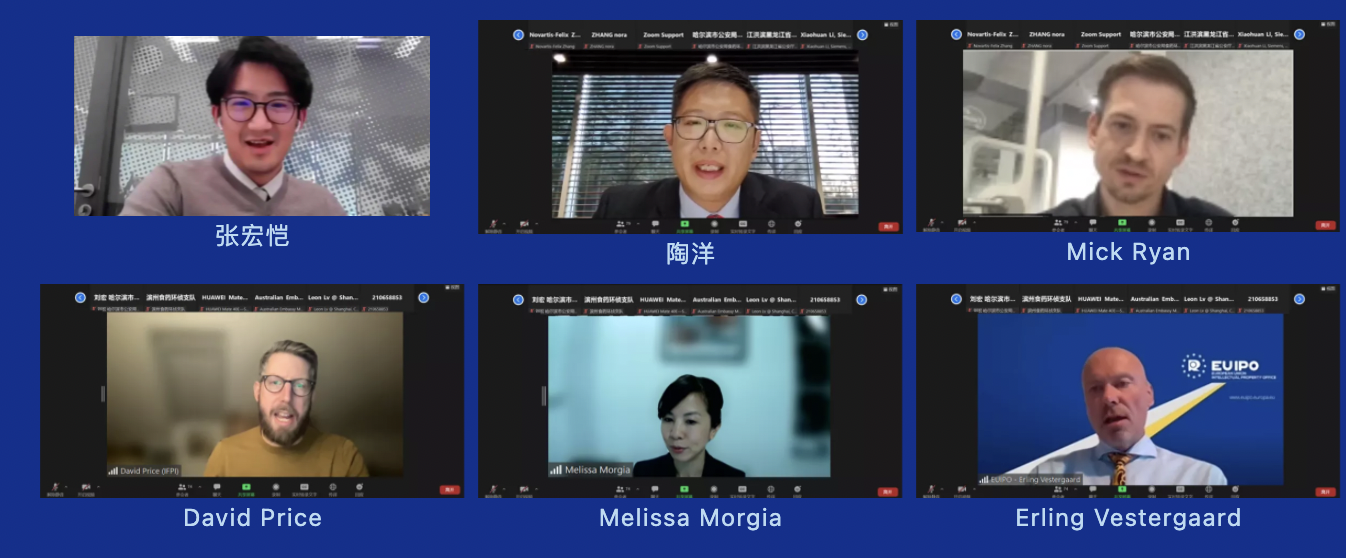
Qu Xiaoyang, Vice Chair of QBPC, and Benoit Misonne, IP Attaché to the Delegation of the European Union to China assigned by EUIPO, made concluding remarks for the forum. Qu Xiaoyang expressed his gratitude to all the participants. He noted that QBPC provided three communication bridges for more than 200 foreign enterprises operating in China: the bridge between the government and enterprises, the bridge between foreign enterprises for experience sharing, and the bridge for international exchanges. The forum was another good practice of international exchanges. Hopefully both parties could strengthen their cooperation and contribute to the further improvement of China's IP environment. In his concluding speech, Benoit Misonne thanked QBPC, speakers and IP right holders for their participation and wonderful sharing. He also expressed his special thanks to representatives of local food, drug and environment crime investigation departments for their active participation and exchanges online, and looked forward to closer cooperation in the future.

Qu Xiaoyang
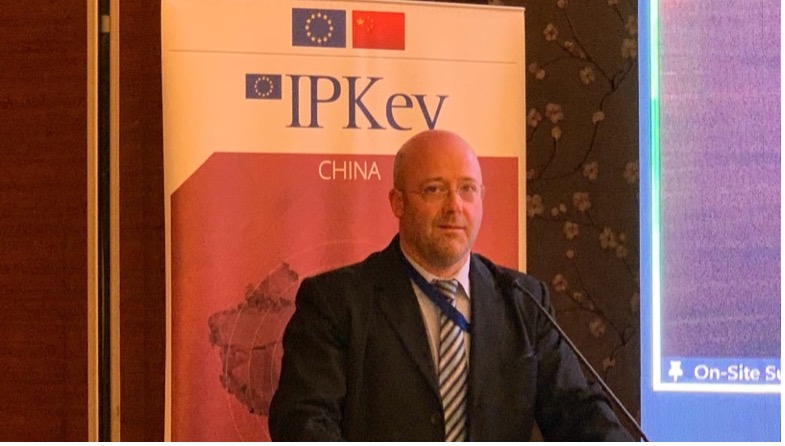
Benoit Misonne
The exchanges on this forum have yielded fruitful results in criminal IP protection, which laid a solid foundation for our future work.
